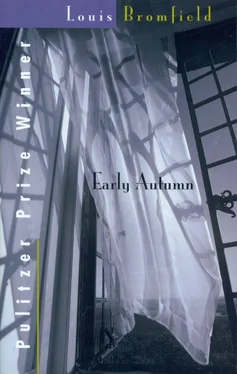She knew vaguely that she must have fallen in love in the moment she stood there in Sabine Callendar’s salon bowing to Lily de Cyon. The experience had grown in intensity when, after lunch, she took him into the garden to show him her dogs and watched him rubbing the ears of the Doberman “Imp” and talking to the dog softly in a way which made her know that he felt about animals as she did. He had been so pleasant in his manner, so gentle in his bigness, so easy to talk to, as if they had always been friends.
And then almost at once he had gone away to the Argentine, without even seeing her again, on a trip to learn the business of cattle-raising because he had the idea that one day he might settle himself as a rancher. But he left behind him a vivid image which with the passing of time grew more and more intense in the depths of a romantic nature which revolted at the idea of Thérèse choosing a father scientifically for her child. It was an image by which she had come, almost unconsciously, to measure other men, even to such small details as the set of their shoulders and the way they used their hands and the timbre of their voices. It was this she had really meant when she said to her mother, “I know what sort of man I want to marry. I know exactly.” She had meant, quite without knowing it, that it must be a man like Jean de Cyon … charming, romantic and a little wild.
She had not forgotten him, though there were moments at the school in Saint-Cloud when she had believed she would never see him again—moments when she was swept by a delicious sense of hopeless melancholy in which she believed that her whole life had been blighted, and which led her to make long and romantic entries in the diary that was kept hidden beneath her mattress. And so as she grew more hopeless, the aura of romance surrounding him took on colors deeper and more varied and intense. She had grown so pale that Mademoiselle Vernueil took to dosing her, and Thérèse accused her abruptly of having fallen in love, a thing she denied vaguely and with overtones of romantic mystery.
And then with the return to Pentlands (a return advised by her mother on account of Jack’s health) the image dimmed a little in the belief that even by the wildest flights of imagination there was no chance of her seeing him again. It became a hopeless passion; she prepared herself to forget him and, in the wisdom of her young mind, grow accustomed to the idea of marrying one of the tame young men who were so much more suitable and whom her family had always known. She had watched her admirers carefully, weighing them always against the image of the young man with red hair, dressed in the black and silver of the cuirassiers, and beside that image they had seemed to her—even the blond, good-looking Mannering boy—like little boys, rather naughty and not half so old and wise as herself. She had reconciled herself secretly and with gravity to the idea of making one of the matches common in her world—a marriage determined by property and the fact that her fiance would be “the right sort of person.”
And so the whole affair had come to take on the color of a tragic romance, to be guarded secretly. Perhaps when she was an old woman she would tell the story to her grandchildren. She believed that whomever she married, she would be thinking always of Jean de Cyon. It was one of those half-comic illusions of youth in which there is more than a grain of melancholy truth.
And then abruptly had come the news of his visit to Brook Cottage. She still kept her secret, but not well enough to prevent her mother and Sabine from suspecting it. She had betrayed herself first on the very night of Jack’s death when she had said, with a sudden light in her eye, “It’s Jean de Cyon. … I’d forgotten he was arriving tonight.” Olivia had noticed the light because it was something which went on and on.
And at Brook Cottage young de Cyon, upset by the delay caused by the funeral and the necessity of respecting the mourning at Pentlands, had sulked and behaved in such a way that he would have been a nuisance to anyone save Sabine, who found amusement in the spectacle. Used to rushing headlong toward anything he desired (as he had rushed into the French army at seventeen and off to the Argentine nine months ago), he turned ill-tempered and spent his days out of doors, rowing on the river and bathing in the solitude of the great white beach. He quarreled with Thérèse, whom he had known since she was a little girl, and tried to be as civil as possible toward the amused Sabine.
She knew by now that he had not come to Durham through any great interest in herself or Thérèse. She knew now how wise she had been (for the purposes of her plan) to have included in her invitation to him the line … “Sybil Pentland lives on the next farm to us. You may remember her. She lunched with us last Armistice Day.”
She saw that he rather fancied himself as a man of the world who was being very clever in keeping his secret. He asked her about Sybil Pentland in a casual way that was transparently artificial, and consulted her on the lapse of time decently necessary before he broke in upon the mourning at Pentlands, and had Miss Pentland shown any admiration for the young men about Durham? If he had not been so charming and impatient he would have bored Sabine to death.
The young man was afraid of only one thing … that perhaps she had changed in some way, that perhaps she was not in the reality as charming as she had seemed to him in the long months of his absence. He was not without experience (indeed, Sabine believed that he had gone to the Argentine to escape from some Parisian complication) and he knew that such calamitous disappointments could happen. Perhaps when he came to know her better the glamour would fade. Perhaps she did not remember him at all. But she seemed to him, after months of romantic brooding, the most desirable woman he had ever seen.
It was a new world in which he discovered himself, in some way a newer and more different world than the vast grass-covered plains from which he had just come. People about Durham, he learned, had a way of saying that Boston and Durham were like England, but this he put down quietly as a kind of snobbery, because Boston and Durham weren’t like England at all, so far as he could see; in spots Boston and Durham seemed old, but there wasn’t the same richness, the same glamour about them. They should have been romantic and yet they were not; they were more, it seemed to him, like the illustrations in a school history. They were dry … sec, he thought, considering the French word better in this case on account of its sound.
And it wasn’t the likeness to England that he found interesting, but rather the difference … the bleak rawness of the countryside and the sight of whole colonies of peoples as strange and foreign as the Czechs and Poles providing a sort of alien background to the whole picture.
He had gone about the business of becoming acquainted with his own country in a thorough, energetic fashion, and being a sensuous youth, filled with a taste for colors and sounds and all the emanations of the spectacle of life, he was acutely conscious of it.
To Sabine, he said, “You know the funny thing is that it seems to me like coming home. It makes me feel that I belong in America … not in Durham, but in New York or some of those big roaring towns I’ve passed through.”
He spoke, naturally enough, not at all like an American but in the clipped English fashion, rather swallowing his words, and now and then with a faint trace of French intonation. His voice was deeper and richer than the New England voices, with their way of calling Charles Street “Challs Street” and sacred Harvard … “Havaad.”
It was the spectacle of New York which had fascinated him more than any other because it surpassed all his dreams of it and all the descriptions people had given him of its immense force and barbaric splendor and the incredible variety of tongues and people. New York, Sabine told him with a consciousness of uttering treason, was America, far more than the sort of life he would encounter in Durham.
Читать дальше












